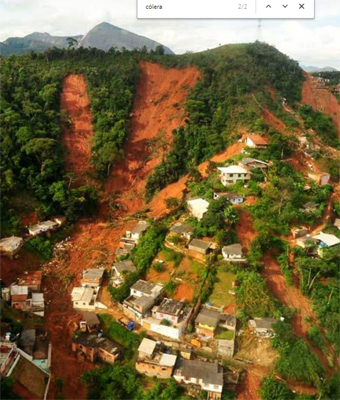As mudanças ambientais e climáticas globais, que têm se intensificado nas últimas décadas, podem produzir impactos sobre a saúde humana com diferentes vias e intensidades. Algumas dessas transformações atingem de forma direta a população, como a ocorrência de secas, ondas de calor, furacões, tempestades e enchentes.
No Brasil, uma das fontes de dados sobre esses desastres são os decretos de situação de emergência ou de estado de calamidade pública reconhecidos pelo governo federal. A sistematização das informações permite identificar a ocorrência desses eventos, sobretudo, os de baixa intensidade, que já causam prejuízos sociais. Apesar das constatações, os municípios não chegam a decretar situação de emergência. Segundo especialistas, os dados devem ser complementados e comparados a registros de chuvas, ventos e níveis dos rios para refletir a variabilidade climática e suas tendências a médio e longo prazo. Além disso, é preciso acompanhar eventos de saúde (internações, notificações de agravos, mortes) que permitam avaliar o impacto desses desastres sobre a vida da população.
Os eventos extremos apresentam como impactos imediatos na saúde das comunidades: mortes, traumas, deslocamento e desalojamento. Em médio prazo, podem surgir surtos de doenças (transmissíveis e não transmissíveis) relacionados às condições de vida a que a população é submetida frente ao desastre e, por vezes, a pouca capacidade de resposta do serviço de saúde local, também atingido. Em longo prazo é necessária atenção e vigilância de doenças crônicas e psicossociais2.
A sistematização dessas informações é um dos caminhos para suprir a falta de dados organizados sobre desastres naturais e eventos climáticos extremos no Brasil. A continuidade desse trabalho permitirá, em longo prazo, a formação de um importante banco de dados sobre o assunto.
Sociedade poderá inserir textos, fotos e vídeos em 'Base Viva'
O Observatório ouviu especialistas e sistematizou informações capazes de descrever a ocorrência de eventos extremos no país e tem trabalhado para propor medidas capazes de direcionar políticas e intervenções nessa área. Em 2007, por exemplo, realizou a IV Oficina do Observatório de Clima e Saúde, com a meta de produzir um inventário de dados e selecionar indicadores de saúde, ambientais, climáticos e socioeconômicos que permitissem monitorar situações de saúde geradas por esse tipo de evento. Os dados passaram a ser disponibilizados de forma livre e gratuita por meio do nosso site, permitindo o acompanhamento de tendências a médio e longo prazo, incluindo situações de emergência.
Tendo em vista a diversidade de situações geradas por esses eventos, o Observatório desenvolveu uma ferramenta que propicia a inserção de informações pelos cidadãos. A interface possibilita a membros de diversos setores relatar com textos, fotos e vídeos um determinado processo de doença relacionado ao clima. Por meio da Base Viva, o projeto avança no quesito interatividade: a sociedade civil poderá colaborar, efetivamente, na construção dessa grande plataforma de dados.
A metodologia de mapeamento participativo facilita que qualquer cidadão contribua para a identificação de áreas que necessitem de respostas imediatas do poder público. Por sua parte, o gestor passará a contar com dados que podem auxiliá-lo na tomada de decisões. Desse modo, a Base Viva busca favorecer o diálogo entre sociedade civil, gestor de saúde e pesquisador. Participe!
Fotografia: Região Serrana Fluminente: 2011: Marino Azevedo/Governo do Estado do Rio de Janeiro. Fonte: Análise de Situação em Clima e Saúde. Rio de Janeiro, RJ: Fundação Instituto Oswaldo Cruz - Fiocruz, Instituto de Comunicação e Informação Científica e Tecnológica - Icict, Ministério da Saúde, Organização Panamericana de Saúde - Opas, 2017.
